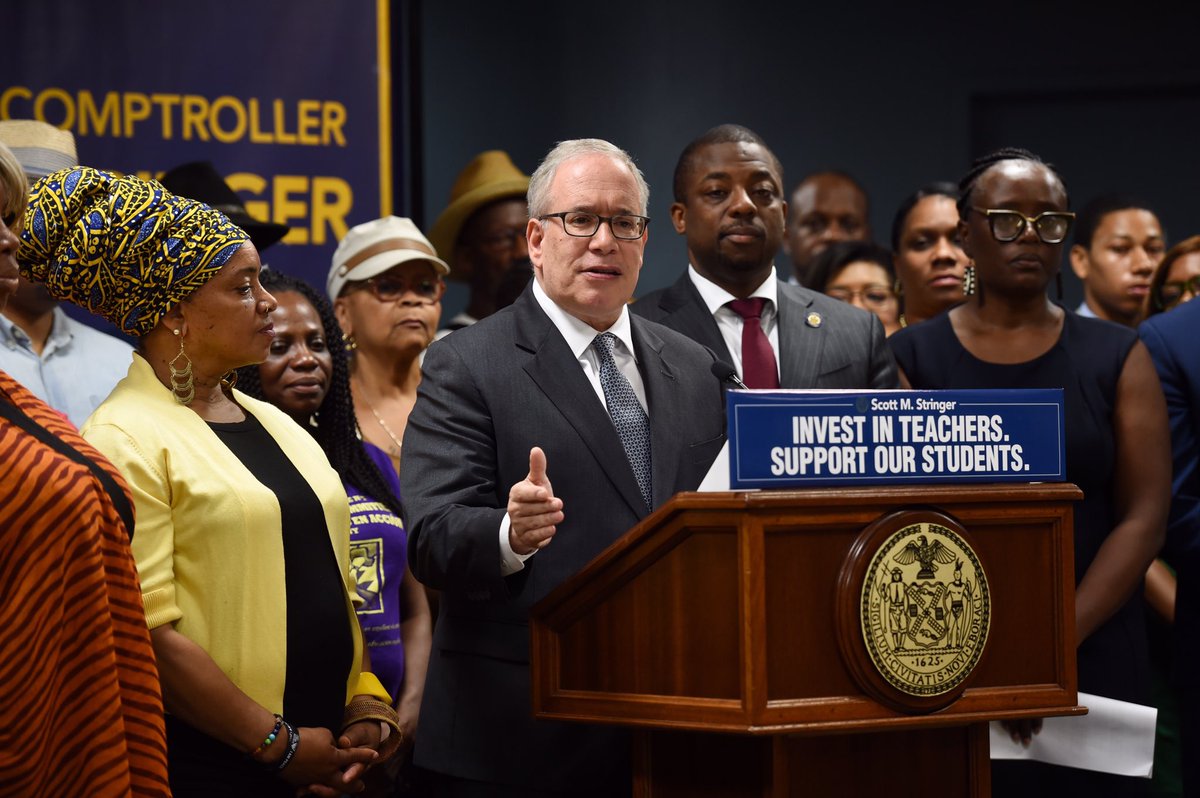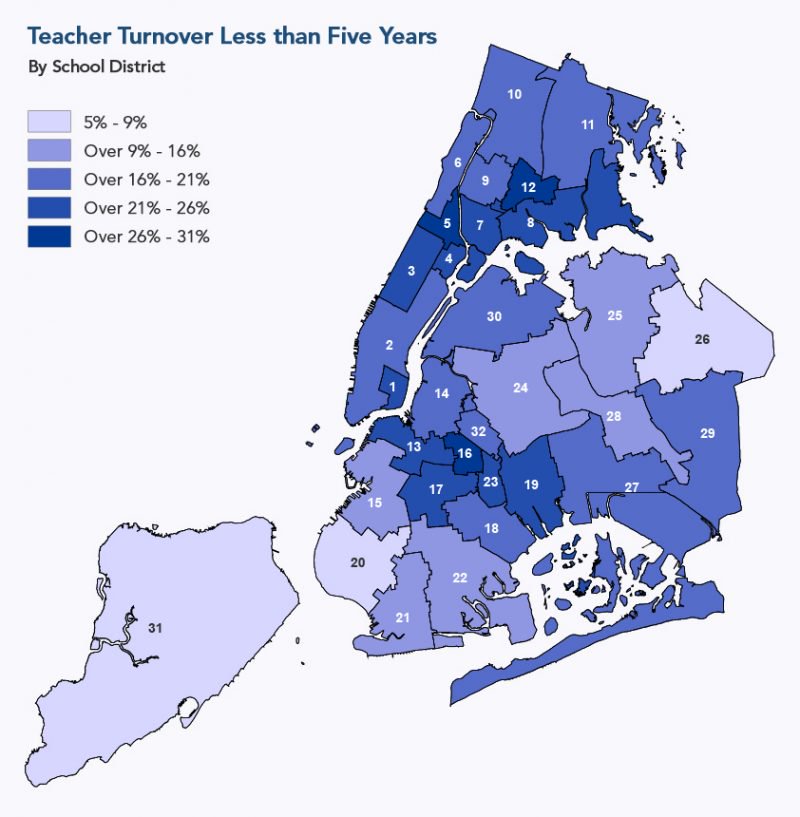To Combat Teacher Exodus From New York City Schools, Comptroller Stringer Proposes Largest Teacher Residency Program in America

Susan Watts / NYC Comptroller's Office
A staggering 41 percent of all teachers hired in the 2012-13 school year left within five years
Comptroller Stringer’s plan would create largest teacher residency program in America, setting a standard for a full year of in-classroom teacher preparation
Stringer plan establishes year-long, paid, classroom residency program to train 1,000 new teachers each year
(New York, NY) – New York City Comptroller Scott M. Stringer today proposed a nation-leading investment in teachers and the City’s public school system to combat persistently high teacher turnover rates, especially among new teachers, that disadvantage high-need school districts and set back the City’s most vulnerable students. In the new report, “Teacher Residencies: Supporting the Next Generation of Teachers and Students,” Comptroller Stringer calls on the City Department of Education (DOE) to establish a large-scale, paid, year-long residency program to vastly expand in-classroom experience for new teachers, and equip them with the classroom skills they need to teach in the country’s largest school district and support New York City’s 1.1 million schoolchildren.
The Comptroller’s analysis reveals how the DOE is failing to keep new teachers, finding that a staggering 41 percent of all teachers hired in the 2012-13 school year left within five years and nearly 20 percent of all public school teachers with less than five years of experience left the classroom in 2017-18 alone. When schools have high teacher turnover, it weakens schools – and weak schools cause students to be left behind, or drop-out. The Comptroller’s plan would close a glaring gap in teacher preparation that fuels teacher workforce attrition, by providing all educators with the skills to identify and support a wide range of academic needs in students – particularly our most vulnerable children, including students with disabilities, multilingual learners, and students experiencing homelessness.
“Our children deserve the very best, and we have to take every step we can to give them a brighter future. That’s what this proposal is all about. If we’re going to give all students a fair shot, adults have to put them first, which means rethinking old approaches and breaking down outdated systems. It’s just a fact – a well-prepared teacher can transform a child’s life. But right now, the City is sending new teachers into the classroom without the experience or tools they need to help our students thrive. We’re throwing them into the deep-end and when they leave, too many of our students can’t stay afloat, as a result,” said New York City Comptroller Scott M. Stringer. “We all know that inequality runs straight through our school system, and that’s why we need to make sure our schools can recruit the best teachers – and support them to ensure they stay, and tap the potential of every student in every classroom. Investing in our kids means investing in our future – and part of that, means helping our teachers be the best they can be. As the nation’s largest school district, New York City should lead for our teachers, our parents, and our 1.1 million schoolchildren.”
“Teacher churn is a major problem for our schools and our students, and we want to thank the Comptroller’s office for their work on this key issue,” said UFT President Michael Mulgrew. “The UFT would love to see a strong collaboration with local universities and a teacher residency program that would help give all incoming teachers a stronger start in their profession.”
Comptroller Stringer Calls for Largest Teacher Residency Program in the Nation
Comptroller Stringer’s proposal creates a large scale residency program for new teachers, in partnership with local higher education institutions, that could train up to 1,000 new teachers each year – paving the way for classroom success and stemming the tide of high teacher turnover.
- Aspiring teachers work alongside a single, accomplished mentor-teacher in a public school classroom for a year, in-tandem with their studies. This would substantially increase the amount of classroom training most new teachers receive, which for most in the City’s alternative preparation programs, can be just a few weeks.
- Candidate teachers would receive a stipend to cover living expenses during the residency year, and mentor-teachers would receive a salary boost.
With proper planning, this residency would reflect a well-aligned collaboration between DOE and our City’s institutions of higher education, including CUNY and SUNY, with regular feedback channels to inform both curriculum and instructional practice, and ensure that new teachers are ready on “day one” to contribute to goals for educational quality needs set by DOE. At full scale, this proposal would replace the current NYC Teaching Fellows program.
Dismal Teacher Retention Rates
Comptroller Stringer’s report shows that in the last ten years, New York City has experienced steady rates of high teacher turnover, peaking in the 2012-13 school year at 18.6 percent turnover for all teachers and 20.5 percent turnover for new hires. Of the 4,600 teachers hired in the 2012-13 school year, 1,882 had left the system by 2017-18 – roughly 41 percent in just five years.
The Department of Education hires an astounding 6,000 new teachers each school year to replace the legions of teachers who leave – racking up significant costs each year to train and replace staff. Citywide, about one-third of teachers in the City have fewer than five years of experience. Moreover, high rates of turnover are concentrated in higher-need school districts, where the surrounding community is often lower-income and where the majority of students are children of color. The report shows:
Turnover Impacts High-Need Students Most
- In the 2017-18 school year, the Bronx and Manhattan experienced the highest rate of teacher turnover among teachers with less than five years of experience, at 22 percent, while Staten Island had a much lower turnover rate of just 8 percent.

- In specific Community School Districts, the turnover rate is much higher. The turnover rate among new teachers in the Bronx’s District 12 was 31 percent, compared with 22 percent across the borough.
- Turnover among teachers at the City’s former Renewal Schools was 21 percent during the 2015-16 school year, higher than the city average.
- Resignations are by far the most common reason for early career teachers leaving the classroom and account for about 80 percent of all departures after two years of teaching.
- In addition, despite the diversity of New York City’s student body – which is 41 percent Hispanic, 26 percent African-American, 16 percent Asian and 15 percent white – approximately 60 percent of New York City teachers are white, highlighting the need for significant recruitment and retention of teachers of color.
- Moreover, the shortage of teachers trained to educate multilingual learners is out of compliance with State regulations to provide equal opportunity across communities. With over 160,000 multilingual learners enrolled in New York City schools, recruiting and retaining well-qualified teachers who can support this population is crucial.
To read Comptroller Stringer’s report, click here.
###